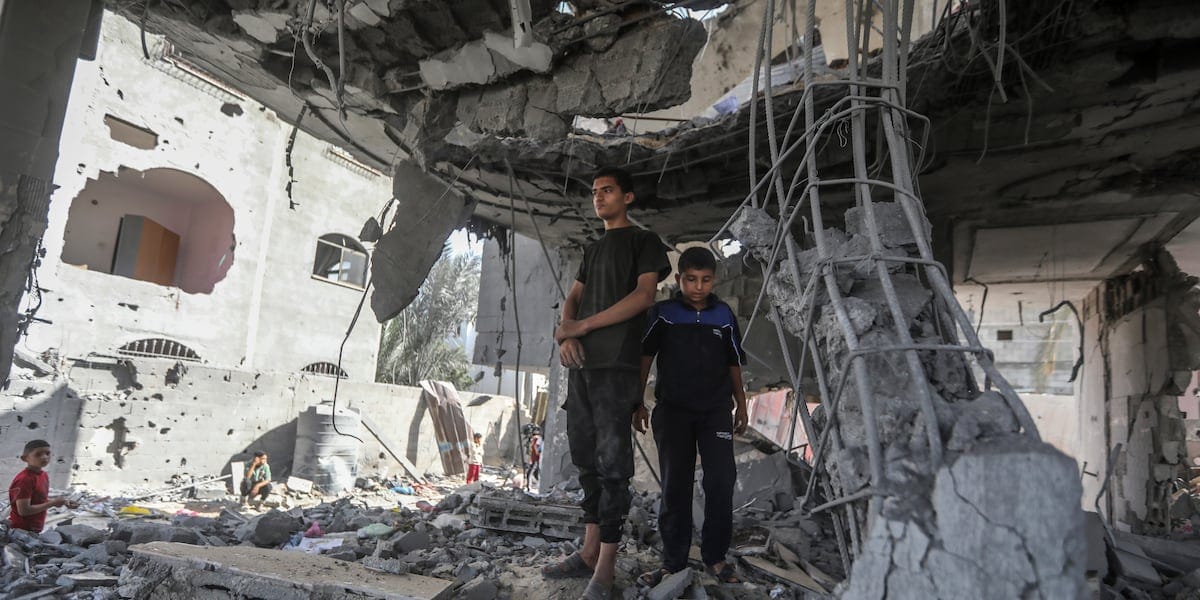Israeli army tells Palestinians to evacuate parts of Rafah ahead of expected assault

Source: WFSB
JERUSALEM (AP) - The Israeli army on Monday ordered tens of thousands of people in the southern city of Rafah in the Gaza Strip to begin evacuating, signaling that a long-promised ground invasion could be imminent.
The announcement complicated last-ditch efforts by international mediators, including the director of the CIA, to broker a cease-fire. Hamas and Qatar, a key mediator, have warned that an invasion of Rafah could derail the talks.
Israel has described Rafah as the last significant Hamas stronghold after seven months of war, and its leaders have repeatedly said they need to carry out a ground invasion to defeat the Islamic militant group.
Lt. Col. Nadav Shoshani, an army spokesman, said some 100,000 people were being ordered to move to a nearby Israel-declared humanitarian zone called Muwasi. He said Israel was preparing a "limited scope operation" and would not say whether this was the beginning of a broader invasion of the city. But last October following the unprecedented Oct. 7 attack on southern Israel by Hamas, Israel did not formally announce the launch of a ground invasion that continues to this day.
The move comes a day after Hamas militants carried out a deadly rocket attack from the Rafah area that killed three Israeli soldiers.
Shoshani said Israel published a map of the evacuation area, and that orders were being issued through air-dropped leaflets, text messages and radio broadcasts. He said Israel has expanded humanitarian aid into Muwasi, including field hospitals, tents, food and water.
Israel's army said on the social platform X it would act with "extreme force" against militants, and urged the population to evacuate immediately for their safety.
Israel's plan to invade Rafah has raised global alarm because of the potential for harm to more than a million Palestinian civilians sheltering there.
About 1.4 million Palestinians -- more than half of Gaza's population -- are jammed into the town and its surroundings. Most of them fled their homes elsewhere in the territory to escape Israel's onslaught and now face another wrenching move, or the danger of facing the brunt of a new assault. They live in densely packed tent camps, overflowing U.N. shelters or crowded apartments, and are dependent on international aid for food, with sanitation systems and medical facilities infrastructure crippled.
The U.N. agency that has helped millions of Palestinians in Gaza and the West Bank for decade, known as UNRWA, warned Monday of devastating consequences of a Rafah offensive, including more civilian suffering and deaths. The agency said it would not leave but stay in Rafah as long as possible to continue providing lifesaving assistance.
The United States, Israel's closest ally, has repeatedly urged Israel not to carry out the invasion, saying it does not have a credible plan to protect civilians.
But even as the U.S., Egypt and Qatar have pushed for a cease-fire agreement, Prime Minister Benjamin Netanyahu repeated last week that the military would move on the town "with or without a deal" to achieve its goal of destroying the Hamas militant group.
On Monday, Netanyahu accused Hamas of "torpedoing" the hostage deal and not budging from its "extreme demands" while vowing to stop the militants from retaking control of Gaza.
On Sunday, Defense Minister Yoav Gallant claimed Hamas wasn't serious about a deal and warned of "a powerful operation in the very near future in Rafah." His comments came after Hamas attacked Israel's main crossing point Sunday for delivering assistance, killing three soldiers.
Shoshani would not say whether the upcoming Rafah operation is a response to Sunday's killing. He said the incident would have no effect on the amounts of badly needed aid entering Gaza because other crossing points remain operational.
He wouldn't comment, however, on U.S. warnings not to invade and wasn't clear on whether the evacuation was coordinated with Egypt.
Egypt, a strategic partner of Israel, has said that an Israeli military seizure of the Gaza-Egypt border -- which is supposed to be demilitarized -- or any move to push Palestinians into Egypt would threaten its four-decade-old peace agreement with Israel.
In Rafah, people received flyers Monday morning in Arabic detailing which neighborhood blocks needed to leave and where humanitarian zones had expanded to. The flyers said that aid services would spread from Deir al Balah in the north to the center of Khan Younis city in the middle of the Gaza Strip.
Palestinians in Rafah said people gathered to discuss their options after receiving the flyers. Most said they did not want to move alone and preferred to travel in groups.
"So many people here are displaced and now they have to move again, but no one will stay here it's not safe," Nidal Alzaanin told The Associated Press by phone.
Alzaanin, a father of five, works for an international aid group and was displaced to Rafah from Beit Hanoun in the north at the start of the war.
He said people are concerned since Israeli troops shot at Palestinians as they moved during previous evacuation orders.
Alzaanin said he has packed his documents and bags but will wait 24 hours to see what others do before relocating. He said he has a friend in Khan Younis whom he hopes can pitch a tent for his family.
